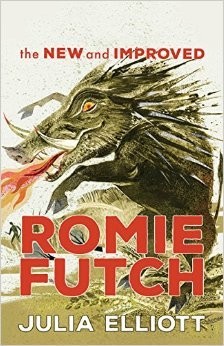by Jesse Davis
I had not heard of Julia Elliott before I picked up her first novel, The New and Improved Romie Futch, but I immediately felt drawn to the book. I liked the cover design — what appeared to be a primeval hog-dragon trampling swampland and belching flame. I flipped the tantalizingly titled tome over for a look at the details on the back cover only to find that Tin House Books, an imprint of one of my favorite literary journals, published the novel. 
The New and Improved Romie Futch introduces the reader to the title character as he girds himself for yet another depressing bender. He is balding, pot-bellied, recently divorced, and his failing taxidermy shop is limping along like a maimed animal, not long for this world. A man with limited options, Romie lives in a small, Southern town, and he finds himself consistently in the shadow of one of his high school friends (now more “frienemy” than anything), an ATV salesman and a picture of stereotypical Southern masculinity. With a brief and disastrous encounter with his ex-wife — she glows; Romie glistens with alcoholic sweat; she is accompanied by her new beau; Romie slumps forlornly among his male cohorts — the scene is set for Romie’s transformation. What else, Romie is forced to wonder, could he possibly have to lose?
So after seeing an online pop-up ad promising a radical, life-changing transformation, Romie throws a few articles of clothing into a duffel bag and signs up for the experimental treatment. This, dear reader, is where the novel gets weird, with new genres rearing their heads, chimera-like. What began as a fairly straightforward New-South-meets-Southern-Gothic foray into contemporary fiction is suddenly a story about low and high art verily vrooming with verbiage. It is also a postmodern grotesquerie that attempts to reconcile the varied, mismatched parts of the Frankenstein monster that, so Elliott would seem to suggest, is the essence of compartmentalized, modern existence. And I would be remiss if I did not give a tip of the hat to the novel’s brave willingness to wear the paranoid science-fiction hat from time to time. (The program in which Romie enrolls smacks of MKUltra, the CIA’s illegal, 23-year-long mind control program.)
The program works, however, and Romie gets smart. He gets super-smart, Flowers for Algernon smart. So are the voices he’s hearing in his head just in his head, or are they some sort of Project Monarch-like intervention undertaken by secretive men and women in lab coats? Is the so-called “hogzilla” terrorizing the countryside also the product of clandestine genetic modification? Is the world ready for a conceptual taxidermy art installation based, in part, on Foucault’s Discipline and Punish: The Birth of the Prison?
The New and Improved Romie Futch is absurd in the most satisfying of ways. Or perhaps it would be more accurate to say that the novel adequately interfaces with the inherent absurdity of contemporary life. While it would be easy to say that Romie’s sadness and loneliness — the original impetus for his enrolment in the experiment in the first place — get lost in the genre shuffle, it is really up to the reader not to let that happen. Romie’s loneliness is right there all along, just under the surface of the fizz and bubble of verbiage and concepts. In fact, it is only accentuated by Romie’s improvement. Whereas before, he hardly fit in with his contemporaries, post-treatment Romie has no peers. He is a true freak — too redneck to fit in with the academics with whom he can suddenly converse and too brilliant to be content pounding domestic beer with his old high school buddies.
Julia Elliott has crafted an achingly heartfelt novel, propelled by a page-turner of a plot all the way until Romie’s inevitable confrontation with the hopped-up “hogzilla.” The New and Improved Romie Futch, true to its postmodern and chimera-like form, deftly balances its strange mix of Southern Gothic and science-fiction, heartfelt and thought-inducing prose, and the result is an infinitely readable offering. Though the novel, with its gene-spliced hero and monstrous boar, is ideal for the Halloween season, it will surely stand the test of time. I’m calling it here and now — this one is destined for cult classic status.
Jesse Davis is a copy editor for The Memphis Flyer and a bookseller for the Booksellers at Laurelwood.